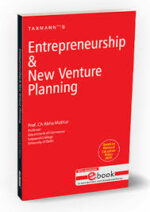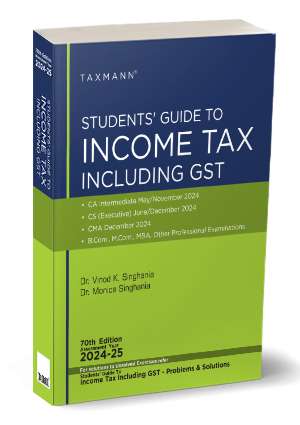Taxmann Entrepreneurship & New Venture Planning for B.Com by Abha Mathur Edition 2024
Taxmann Entrepreneurship & New Venture Planning for B.Com by Abha Mathur Edition 2024
Description
Taxmann Entrepreneurship & New Venture Planning for B.Com by Abha Mathur Edition 2024
Description
This book motivates individuals to embrace entrepreneurship as a viable career path, enhance entrepreneurial capabilities, and offer practical guidance on initiating independent business ventures. It emphasizes the cultivation of creative thinking to improve efficiency in both professional and personal arenas, sheds light on the pivotal role of entrepreneurship within Indian society and encourages the generation of innovative business concepts.
This book will be helpful for B.Com. Semester-IV students at the University of Delhi under the Discipline Specific Core Course DSC-4.1, following the New Education Policy. It is both an educational tool and a manual for budding entrepreneurs, enabling them to effectively refine and actualize their business concepts. Drawing on industry experts’ insights and real-life success stories, the book presents a comprehensive overview of the entrepreneurial field, motivating students to discover, innovate, and contribute to the nation’s economic development and societal well-being through entrepreneurship.
The Present Publication is the latest edition, authored by Prof. CA. Abha Mathur, with the following key aspects:
- [Objectives] The book aims to:
- Cultivate creative and effective thinking for professional and personal success
- Highlight the significance of entrepreneurship in modern Indian society
- Encourage entrepreneurial thought among students, prompting them to explore business opportunities
- Inform students about startups, entrepreneurial figures, and government initiatives targeting entrepreneurship to combat unemployment in India
- [Learning Outcomes] Readers can expect to gain:
- A thorough understanding of entrepreneurship and its contribution to economic prosperity
- The acumen to identify and assess potential business ventures
- Competencies in formulating and executing robust business strategies
- Knowledge of efficiently managing financial, human, and additional resources for a startup
- Awareness of governmental schemes that support entrepreneurial activities
- [Content and Methodology] Highlights include:
- A language that simplifies complex concepts for better comprehension and retention
- Guidance on materializing innovative ideas into successful small-scale enterprises, emphasizing the demand for entrepreneurship within the Indian context
- A curriculum-aligned structure offering hands-on exercises and guidelines to bolster entrepreneurial skills
- [Practical Components] The book suggests numerous engaging activities such as:
- Imagining a business venture
- Performing a personal SWOT analysis
- Keeping abreast of global business trends
- It further promotes the practical application of theoretical knowledge through projects, exercises, contests, and seminars aimed at enhancing entrepreneurial capabilities
The detailed contents of the book are as follows:
- Introduction to Entrepreneurship
- Foundational Concepts – Starts with an analysis of the definition and history of the term’ entrepreneur,’ followed by a discussion of entrepreneurship’s meaning, nature, and concept, including its historical context and significance in Indian society
- Entrepreneurial Mindset and Traits – Discusses the attributes and development methods of an entrepreneurial mindset alongside the traits and qualities essential for entrepreneurs
- Entrepreneurship Process and Theories – Covers the process of entrepreneurship, various theories, and factors influencing the emergence of entrepreneurship, including those that promote it
- Economic and Social Roles – Details the entrepreneur’s role in economic growth as an innovator, employment generation, complementing economic growth, and contributing to social stability and balanced regional development. It concludes with an overview of the role and significance of entrepreneurs in society
- Types of Entrepreneurs
- Classification and Profiles – Identifies different types and categories of entrepreneurs, with a special focus on women entrepreneurs, profiling notable figures like Kiran Mazumdar Shaw and Ekta Kapoor
- Exploring Entrepreneurship Types – Examines social entrepreneurship, corporate entrepreneurship, and family businesses, discussing their characteristics, advantages, and disadvantages, as well as the concept, structure, and evolution of family firms
- Entrepreneurial Venture
- Venture Creation and Management – Outlines the creation, characteristics, prerequisites for success, stages, and potential failures of entrepreneurial ventures, along with strategies to overcome these failures
- Innovation and Ideas – Focuses on generating business ideas, team building, sources of innovation, creativity, and managing innovation challenges, featuring methods and examples of creativity and innovation in entrepreneurship
- Mobilizing Resources
- Resource Mobilization – Addresses the types and processes of mobilizing resources for entrepreneurship, including financial, intellectual, human, and other forms
- Funding and Support – Details the arrangement of funds, writing funding proposals, traditional financing sources, venture capital, angel investors, and business incubators, covering their advantages, disadvantages, and specific examples
- Managerial Aspects and Government Initiatives
- Business Management – Covers managing finance, capital structure, organizational structure, and human resources in a new enterprise, including objectives, steps, and significance
- Marketing and Relationships – Discussed market strategies, cash management, cost management, and customer relationship management, emphasizing best practices and techniques
- Government Support – Concludes with an overview of government initiatives for promoting entrepreneurship, such as schemes for startups and the Make in India initiative, highlighting its vision, objectives, benefits, criticism, and scope
Read Less
About the author
Abha Mathur
Professor CA Abha Mathur is a professor at Satyawati College, University of Delhi. With an impressive background as a Chartered Accountant, her academic portfolio is rich with qualifications, including a B.Com (Honours), M.Com, a Postgraduate Diploma in Business Management, a Diploma in Computer Programming, and a PhD from the Department of Commerce, University of Delhi. Her career spans over thirty years, featuring over a decade in the industry before transitioning to academia.
Beginning her career in finance, Professor Mathur held the Manager (Finance) position at Pure Drinks, New Delhi Ltd., eventually advancing to senior roles in financial operations across the private sector until 1995. Her transition to academia in 1995 was driven by her passion for teaching, leading her to contribute significantly to academic and professional domains since joining Delhi University.
Professor Mathur’s academic contributions are noteworthy, including her role as Joint Coordinator in developing the ‘Tourism’ paper for the B.A. Program Application course and serving as Paper Coordinator for ‘Accounting for Managerial Decisions’ at the M.Com level through e-Pg Pathshala, an MHRD initiative for distance learning. Her dedication to education is further highlighted by her involvement in creating content for 15 modules, audio/video recording 96 modules for online platforms, and engaging as a resource person in various workshops and lectures.
Her research contributions are substantial, with 11 papers presented at national seminars and 26 articles published in leading journals. Moreover, her administrative roles have been versatile, including positions such as Bursar, examination superintendent, Coordinator of the IGNOU Centre, and Acting Principal, among others. Professor Mathur has also significantly contributed to entrepreneurship through her role as the Nodal Officer for UDHMODYA, a Government of India initiative.
An accomplished author, she has penned multiple textbooks covering various business and management topics, contributing extensively to academic literature. Additionally, she has written books in Hindi, sharing moral stories for children, showcasing her diverse interests and commitment to education.
Professor Mathur’s engagement in social causes is reflected in her roles with NGOs, which are focused on consumer and social issues. She has been recognized for her excellence in teaching, receiving the ‘Best Teacher Award’ from the Delhi Government in 2019, and continues to positively impact the academic and social spheres. For more information, visit her website at https://cadrabhamathuronline.com.
Additional information
| Weight | 0.2 kg |
|---|---|
| Binding | |
| Edition | |
| Language | |
| Publisher | |
| Authors | |
| ISBN |








Rating & Review
There are no reviews yet.